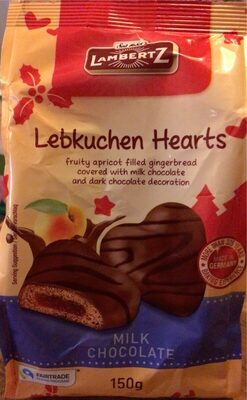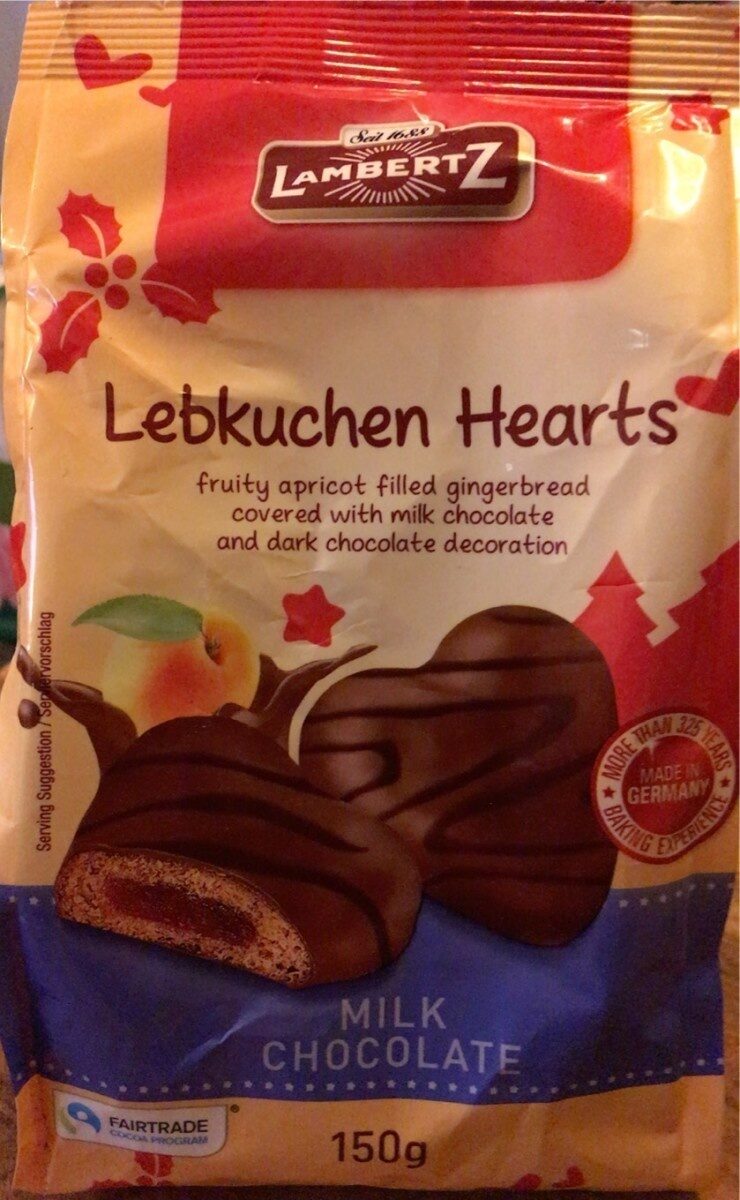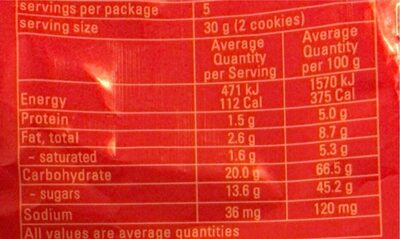Help us make food transparency the norm!
As a non-profit organization, we depend on your donations to continue informing consumers around the world about what they eat.
The food revolution starts with you!
Lebkuchen hearts - Lambertz
Lebkuchen hearts - Lambertz
This product page is not complete. You can help to complete it by editing it and adding more data from the photos we have, or by taking more photos using the app for Android or iPhone/iPad. Thank you!
×
Barcode: 4006894308006 (EAN / EAN-13)
Brands: Lambertz
Categories: Snacks, Sweet snacks, Biscuits and cakes, Gingerbreads
Labels, certifications, awards: Made in Germany
Countries where sold: United Kingdom
Matching with your preferences
Health
Ingredients
-
39 ingredients
Glucose Fructose Syrup (Wheat), Wheat Flour, Sugar, Apricot Puree, Cocoa Butter, Milk Solids, Cocoa Mass, Caramelised Sugar Syrup, Natural Flavour, Acidity Regulator (E330), Gelling Agent (440), Raising Agents (450, 500, 501), Acidity Regulator (332), Spices, Pure Butterfat (Milk), Emulsifier (Soy Lecithin), Salt. Milk Chocolate Contains min. 30% Cocoa Solids and 18% Milk Solids. Dark Chocolate Contains min. 50% Cocoa Solids. CONTAINS: WHEAT, MILK AND SOY. MAY CONTAIN: TREE NUTS, PEANUTS, EGG, LUPIN AND SESAME. Made in Germany GB Gingerbread hearts with apricot fruit filling (28%), coated with milk chocolate (2300) COCOA Fairtrade c with non-e mass bala Visit info: Store in a d Net. wt. 150 F Best befo 00, 7Allergens: Gluten, Milk, SoybeansTraces: Eggs, Lupin, Nuts, Peanuts, Sesame seeds
Food processing
-
Ultra processed foods
Elements that indicate the product is in the 4 - Ultra processed food and drink products group:
- Additive: E322 - Lecithins
- Additive: E440 - Pectins
- Additive: E450 - Diphosphates
- Ingredient: Emulsifier
- Ingredient: Flavouring
- Ingredient: Gelling agent
- Ingredient: Glucose
Food products are classified into 4 groups according to their degree of processing:
- Unprocessed or minimally processed foods
- Processed culinary ingredients
- Processed foods
- Ultra processed foods
The determination of the group is based on the category of the product and on the ingredients it contains.
Additives
-
E322 - Lecithins
Lecithins are natural compounds commonly used in the food industry as emulsifiers and stabilizers.
Extracted from sources like soybeans and eggs, lecithins consist of phospholipids that enhance the mixing of oil and water, ensuring smooth textures in various products like chocolates, dressings, and baked goods.
They do not present any known health risks.
-
E322i - Lecithin
Lecithins are natural compounds commonly used in the food industry as emulsifiers and stabilizers.
Extracted from sources like soybeans and eggs, lecithins consist of phospholipids that enhance the mixing of oil and water, ensuring smooth textures in various products like chocolates, dressings, and baked goods.
They do not present any known health risks.
-
E330 - Citric acid
Citric acid is a natural organic acid found in citrus fruits such as lemons, oranges, and limes.
It is widely used in the food industry as a flavor enhancer, acidulant, and preservative due to its tart and refreshing taste.
Citric acid is safe for consumption when used in moderation and is considered a generally recognized as safe (GRAS) food additive by regulatory agencies worldwide.
-
E332 - Potassium citrates
Potassium citrate: Potassium citrate -also known as tripotassium citrate- is a potassium salt of citric acid with the molecular formula K3C6H5O7. It is a white, hygroscopic crystalline powder. It is odorless with a saline taste. It contains 38.28% potassium by mass. In the monohydrate form it is highly hygroscopic and deliquescent. As a food additive, potassium citrate is used to regulate acidity and is known as E number E332. Medicinally, it may be used to control kidney stones derived from either uric acid or cystine.Source: Wikipedia
-
E440 - Pectins
Pectins (E440) are natural carbohydrates, predominantly found in fruits, that act as gelling agents in the food industry, creating the desirable jelly-like texture in jams, jellies, and marmalades.
Pectins stabilize and thicken various food products, such as desserts, confectioneries, and beverages, ensuring a uniform consistency and quality.
Recognized as safe by various health authorities, pectins have been widely used without notable adverse effects when consumed in typical dietary amounts.
-
E450 - Diphosphates
Diphosphates (E450) are food additives often utilized to modify the texture of products, acting as leavening agents in baking and preventing the coagulation of canned food.
These salts can stabilize whipped cream and are also found in powdered products to maintain their flow properties. They are commonly present in baked goods, processed meats, and soft drinks.
Derived from phosphoric acid, they're part of our daily phosphate intake, which often surpasses recommended levels due to the prevalence of phosphates in processed foods and drinks.
Excessive phosphate consumption is linked to health issues, such as impaired kidney function and weakened bone health. Though diphosphates are generally regarded as safe when consumed within established acceptable daily intakes, it's imperative to monitor overall phosphate consumption to maintain optimal health.
-
E500 - Sodium carbonates
Sodium carbonates (E500) are compounds commonly used in food preparation as leavening agents, helping baked goods rise by releasing carbon dioxide when they interact with acids.
Often found in baking soda, they regulate the pH of food, preventing it from becoming too acidic or too alkaline. In the culinary world, sodium carbonates can also enhance the texture and structure of foods, such as noodles, by modifying the gluten network.
Generally recognized as safe, sodium carbonates are non-toxic when consumed in typical amounts found in food.
-
E501 - Potassium carbonates
Potassium carbonate: Potassium carbonate -K2CO3- is a white salt, which is soluble in water -insoluble in ethanol- and forms a strongly alkaline solution. It can be made as the product of potassium hydroxide's absorbent reaction with carbon dioxide. It is deliquescent, often appearing a damp or wet solid. Potassium carbonate is used in the production of soap and glass.Source: Wikipedia
Ingredients analysis
-
May contain palm oil
Ingredients that may contain palm oil: Butterfat
-
Non-vegan
Non-vegan ingredients: Milk solids, Butterfat, Milk chocolate, Milk chocolateSome ingredients could not be recognized.
We need your help!
You can help us recognize more ingredients and better analyze the list of ingredients for this product and others:
- Edit this product page to correct spelling mistakes in the ingredients list, and/or to remove ingredients in other languages and sentences that are not related to the ingredients.
- Add new entries, synonyms or translations to our multilingual lists of ingredients, ingredient processing methods, and labels.
If you would like to help, join the #ingredients channel on our Slack discussion space and/or learn about ingredients analysis on our wiki. Thank you!
-
Vegetarian status unknown
Unrecognized ingredients: 440, 450, 500, 501, 332, Contains-min, Cocoa-solids-and-18-milk-solids, Contains-min, Made-in-germany-gb-gingerbread-hearts-with-apricot-fruit-filling, 2300, Cocoa-fairtrade-c-with-non-e-mass-bala-visit-info, Store-in-a-d-net, Wt, 150-f-best-befo-00, 7Some ingredients could not be recognized.
We need your help!
You can help us recognize more ingredients and better analyze the list of ingredients for this product and others:
- Edit this product page to correct spelling mistakes in the ingredients list, and/or to remove ingredients in other languages and sentences that are not related to the ingredients.
- Add new entries, synonyms or translations to our multilingual lists of ingredients, ingredient processing methods, and labels.
If you would like to help, join the #ingredients channel on our Slack discussion space and/or learn about ingredients analysis on our wiki. Thank you!
-
Details of the analysis of the ingredients
We need your help!
Some ingredients could not be recognized.
We need your help!
You can help us recognize more ingredients and better analyze the list of ingredients for this product and others:
- Edit this product page to correct spelling mistakes in the ingredients list, and/or to remove ingredients in other languages and sentences that are not related to the ingredients.
- Add new entries, synonyms or translations to our multilingual lists of ingredients, ingredient processing methods, and labels.
If you would like to help, join the #ingredients channel on our Slack discussion space and/or learn about ingredients analysis on our wiki. Thank you!
en: Glucose Fructose Syrup (Wheat), Wheat Flour, Sugar, Apricot Puree, Cocoa Butter, Milk Solids, Cocoa Mass, Caramelised Sugar Syrup, Natural Flavour, Acidity Regulator (e330), Gelling Agent (440), Raising Agents (450, 500, 501), Acidity Regulator (332), Spices, Butterfat, Emulsifier (Soy Lecithin), Salt, Milk Chocolate, Contains min, Cocoa Solids and 18% Milk Solids 30%, Dark Chocolate, Contains min, Cocoa Solids 50%, Made in Germany GB Gingerbread hearts with apricot fruit filling 28%, with milk chocolate (2300), COCOA Fairtrade c with non-e mass bala Visit info (Store in a d Net, wt, 150 F Best befo 00), 7- Glucose Fructose Syrup -> en:glucose-fructose-syrup - vegan: yes - vegetarian: yes - ciqual_food_code: 31077
- Wheat -> en:wheat - vegan: yes - vegetarian: yes - ciqual_proxy_food_code: 9410
- Wheat Flour -> en:wheat-flour - vegan: yes - vegetarian: yes - ciqual_proxy_food_code: 9410
- Sugar -> en:sugar - vegan: yes - vegetarian: yes - ciqual_proxy_food_code: 31016
- Apricot Puree -> en:apricot-puree - vegan: yes - vegetarian: yes - ciqual_food_code: 13000
- Cocoa Butter -> en:cocoa-butter - vegan: yes - vegetarian: yes - ciqual_food_code: 16030
- Milk Solids -> en:milk-solids - vegan: no - vegetarian: yes - ciqual_proxy_food_code: 19051
- Cocoa Mass -> en:cocoa-paste - vegan: yes - vegetarian: yes - ciqual_proxy_food_code: 16030
- Caramelised Sugar Syrup -> en:caramelised-sugar-syrup - vegan: yes - vegetarian: yes - ciqual_proxy_food_code: 31016
- Natural Flavour -> en:natural-flavouring - vegan: maybe - vegetarian: maybe
- Acidity Regulator -> en:acidity-regulator
- e330 -> en:e330 - vegan: yes - vegetarian: yes
- Gelling Agent -> en:gelling-agent
- 440 -> en:440
- Raising Agents -> en:raising-agent
- 450 -> en:450
- 500 -> en:500
- 501 -> en:501
- Acidity Regulator -> en:acidity-regulator
- 332 -> en:332
- Spices -> en:spice - vegan: yes - vegetarian: yes
- Butterfat -> en:butterfat - vegan: no - vegetarian: yes - from_palm_oil: maybe - ciqual_food_code: 16401
- Emulsifier -> en:emulsifier
- Soy Lecithin -> en:soya-lecithin - vegan: yes - vegetarian: yes - ciqual_food_code: 42200
- Salt -> en:salt - vegan: yes - vegetarian: yes - ciqual_food_code: 11058
- Milk Chocolate -> en:milk-chocolate - vegan: no - vegetarian: yes - ciqual_food_code: 31004
- Contains min -> en:contains-min
- Cocoa Solids and 18% Milk Solids -> en:cocoa-solids-and-18-milk-solids - percent: 30
- Dark Chocolate -> en:dark-chocolate - vegan: maybe - vegetarian: yes - ciqual_proxy_food_code: 31074
- Contains min -> en:contains-min
- Cocoa Solids -> en:cocoa-solids - vegan: yes - vegetarian: yes - ciqual_proxy_food_code: 18100 - percent: 50
- Made in Germany GB Gingerbread hearts with apricot fruit filling -> en:made-in-germany-gb-gingerbread-hearts-with-apricot-fruit-filling - percent: 28
- with milk chocolate -> en:milk-chocolate - vegan: no - vegetarian: yes - ciqual_food_code: 31004
- 2300 -> en:2300
- COCOA Fairtrade c with non-e mass bala Visit info -> en:cocoa-fairtrade-c-with-non-e-mass-bala-visit-info
- Store in a d Net -> en:store-in-a-d-net
- wt -> en:wt
- 150 F Best befo 00 -> en:150-f-best-befo-00
- 7 -> en:7
Nutrition
-
Bad nutritional quality
⚠ ️Warning: the amount of fiber is not specified, their possible positive contribution to the grade could not be taken into account.⚠ ️Warning: the amount of fruits, vegetables and nuts is not specified on the label, it was estimated from the list of ingredients: 6This product is not considered a beverage for the calculation of the Nutri-Score.
Positive points: 0
- Proteins: 3 / 5 (value: 5, rounded value: 5)
- Fiber: 0 / 5 (value: 0, rounded value: 0)
- Fruits, vegetables, nuts, and colza/walnut/olive oils: 0 / 5 (value: 6.25, rounded value: 6.3)
Negative points: 20
- Energy: 4 / 10 (value: 1569, rounded value: 1569)
- Sugars: 10 / 10 (value: 45.2, rounded value: 45.2)
- Saturated fat: 5 / 10 (value: 5.3, rounded value: 5.3)
- Sodium: 1 / 10 (value: 120, rounded value: 120)
The points for proteins are not counted because the negative points are greater or equal to 11.
Nutritional score: (20 - 0)
Nutri-Score:
-
Nutrient levels
-
Fat in moderate quantity (8.7%)
What you need to know- A high consumption of fat, especially saturated fats, can raise cholesterol, which increases the risk of heart diseases.
Recommendation: Limit the consumption of fat and saturated fat- Choose products with lower fat and saturated fat content.
-
Saturated fat in high quantity (5.3%)
What you need to know- A high consumption of fat, especially saturated fats, can raise cholesterol, which increases the risk of heart diseases.
Recommendation: Limit the consumption of fat and saturated fat- Choose products with lower fat and saturated fat content.
-
Sugars in high quantity (45.2%)
What you need to know- A high consumption of sugar can cause weight gain and tooth decay. It also augments the risk of type 2 diabetes and cardio-vascular diseases.
Recommendation: Limit the consumption of sugar and sugary drinks- Sugary drinks (such as sodas, fruit beverages, and fruit juices and nectars) should be limited as much as possible (no more than 1 glass a day).
- Choose products with lower sugar content and reduce the consumption of products with added sugars.
-
Salt in moderate quantity (0.3%)
What you need to know- A high consumption of salt (or sodium) can cause raised blood pressure, which can increase the risk of heart disease and stroke.
- Many people who have high blood pressure do not know it, as there are often no symptoms.
- Most people consume too much salt (on average 9 to 12 grams per day), around twice the recommended maximum level of intake.
Recommendation: Limit the consumption of salt and salted food- Reduce the quantity of salt used when cooking, and don't salt again at the table.
- Limit the consumption of salty snacks and choose products with lower salt content.
-
-
Nutrition facts
Nutrition facts As sold
for 100 g / 100 mlCompared to: Gingerbreads Energy 1,569 kj
(375 kcal)+7% Fat 8.7 g +57% Saturated fat 5.3 g +172% Carbohydrates 66.5 g -3% Sugars 45.2 g +12% Fiber ? Proteins 5 g +4% Salt 0.3 g -28% Fruits‚ vegetables‚ nuts and rapeseed‚ walnut and olive oils (estimate from ingredients list analysis) 6.25 %
Environment
-
Eco-Score B - Low environmental impact
⚠ ️Select a country in order to include the full impact of transportation.The Eco-Score is an experimental score that summarizes the environmental impacts of food products.→ The Eco-Score was initially developped for France and it is being extended to other European countries. The Eco-Score formula is subject to change as it is regularly improved to make it more precise and better suited to each country.Life cycle analysis
-
Average impact of products of the same category: A (Score: 86/100)
Category: Gingerbread
Category: Gingerbread
- PEF environmental score: 0.23 (the lower the score, the lower the impact)
- including impact on climate change: 1.69 kg CO2 eq/kg of product
Stage Impact Agriculture
69.3 %Processing
15.4 %Packaging
8.1 %Transportation
5.1 %Distribution
2.1 %Consumption
0.0 %
Bonuses and maluses
-
Missing origins of ingredients information
Malus: -5
⚠ ️ The origins of the ingredients of this product are not indicated.
If they are indicated on the packaging, you can modify the product sheet and add them.
If you are the manufacturer of this product, you can send us the information with our free platform for producers.
-
Missing packaging information for this product
Malus: -15
⚠ ️ The information about the packaging of this product is not filled in.⚠ ️ For a more precise calculation of the Eco-Score, you can modify the product page and add them.
If you are the manufacturer of this product, you can send us the information with our free platform for producers.
Eco-Score for this product
-
Impact for this product: B (Score: 66/100)
Product: Lebkuchen hearts - Lambertz
Life cycle analysis score: 86
Sum of bonuses and maluses: -20
Final score: 66/100
-
Carbon footprint
-
Equal to driving 0.9 km in a petrol car
169 g CO² per 100g of product
The carbon emission figure comes from ADEME's Agribalyse database, for the category: Gingerbread (Source: ADEME Agribalyse Database)
Stage Impact Agriculture
61.5 %Processing
11.8 %Packaging
17.1 %Transportation
8.5 %Distribution
1.2 %Consumption
0.0 %
Packaging
-
Missing packaging information for this product
⚠ ️ The information about the packaging of this product is not filled in.Take a photo of the recycling information Take a photo of the recycling information
Transportation
-
Origins of ingredients
Missing origins of ingredients information
⚠ ️ The origins of the ingredients of this product are not indicated.
If they are indicated on the packaging, you can modify the product sheet and add them.
If you are the manufacturer of this product, you can send us the information with our free platform for producers.Add the origins of ingredients for this product Add the origins of ingredients for this product
Report a problem
-
Incomplete or incorrect information?
Category, labels, ingredients, allergens, nutritional information, photos etc.
If the information does not match the information on the packaging, please complete or correct it. Open Food Facts is a collaborative database, and every contribution is useful for all.
Data sources
Product added on by kiliweb
Last edit of product page on by petter2.
Product page also edited by baileysloan, openfoodfacts-contributors, teolemon, yuka.sY2b0xO6T85zoF3NwEKvlkBrDvTXsDv0LR_jhWiuw8mFAIDpcNFv2tiiNKg.










